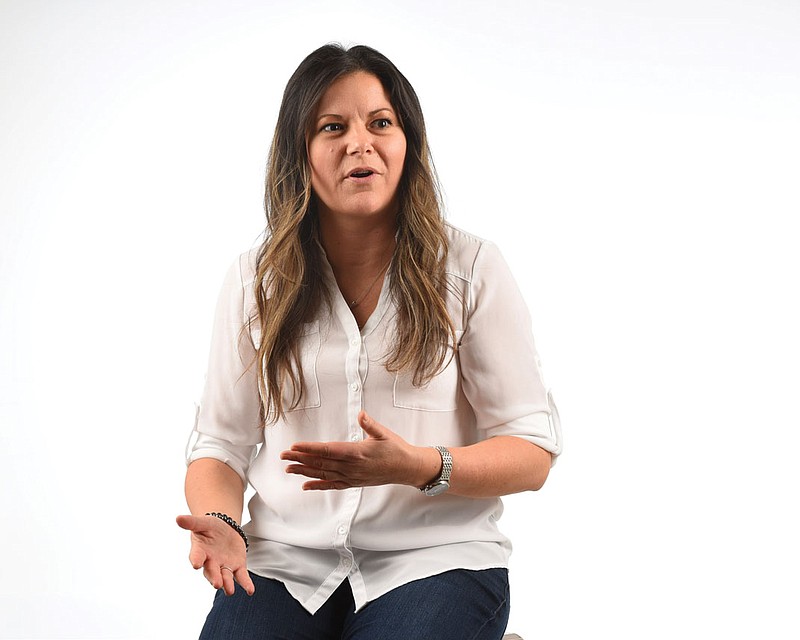For most of her career as a mechanic, engineer and manufacturing consultant, Sabrina Butcher has been one of the few - and sometimes the only - woman among male colleagues on the shop floor or the corporate office.
Butcher grew up working on cars with her father in Fort Wayne, Indiana, and followed her mechanical and engineering instincts into the workplace - against the advice of her own father who taught her many of those skills.
She acquired the name Lucy, which she has used to brand the consulting business she started last year in Chattanooga after a career with Norfolk Southern Railroad, Guardian Industries and General Motors. She taught lean manufacturing and continuous improvement techniques across the country for the railroad before deciding to settle down with her own company in Chattanooga and focus those skills on a helping a variety of local companies figure ways to to handle the discomfort of fear and stress of making change and how to improve their operating efficiency.
While working at her firm "Lucy Does," Butcher also was looking for a way to volunteer and connect with her new hometown and decided to join the Mayor's Women's Council. She was asked last year to lead one of the task forces on how to encourage women to enter jobs predominantly held by men. Butcher, whose own experiences has usually been on jobs where most of her colleagues are men, is heading up an initiative known as "All Lanes Open." The group began last November and is looking to develop ways to improve gender diversity in many male-dominated fields, which often pay the most money.
In 2014, the most recent year for which such data in available, women's median weekly paychecks in metropolitan Chattanooga were $719, or 82.5 percent of the median weekly pay of $871 for men in the same year. Women were less than 1 percent of the local workforce for jobs such as brick masons, mining operators, diesel mechanics and crane operators - all of which paid above average area wage rates. Less than 12 percent of all engineers in Chattanooga area women, according to the U.S. Bureau of Labor Statistics.
Butcher recalls one of her male managers at an Indiana plant asking her why she thought there were not more women like her in manufacturing. It's a question that has long intrigued Butcher and one that the All Lanes Open task force is exploring.
Q. Why do you think there are fewer women in manufacturing?
A. I think women don't see it as an option and its' not seen as attractive. Historically, what you see on television is that factories are dirty and loud and involve a lot of physical work. It's all of those things that women can be a little intimated by and therefore they tend to avoid.
I also think women don't see as many role models, not just in manufacturing jobs, but in many roles as mechanics or supervisors or police officers. Companies are developing strategies to help showcase more women in these traditionally male roles, but women are just less likely to see other women in these type jobs.
Q. Why should more women want to go into manufacturing fields traditionally held by men?
A. Manufacturing is heavily automated now so it requires you to have an understanding of robotics programming, how to understand ladder logic and how to operate use your brain more than your back. It is a job that usually pays better than average and has good benefits and there is a real benefit in seeing and knowing how something is built.
If you are like me and you like to work with your hands, or to figure things out and to see how they are made, and are looking for consistent, dependable jobs with good benefits, then I think manufacturing is an attractive area for men and women.
I feel like there should be more women in manufacturing, not just to say that there is, there is likely to be more ideas to help provide real world solutions. We're different as women how we see things and physically how things are practiced and used and there needs to be consideration of both men and women when products are being designed and developed. The only way you are going to get that feedback is when a woman is working there.'
Q. You said your father taught you about fixing cars and was a role model for you. Did he help you to become a mechanic and engineer?
A. No. My dad, who was a mechanic and whose footsteps I was following in, discouraged me from following his profession. I thought I was going to take over his garage, but he told me I should do something else. He didn't want me working with the torches and hoists. He is certainly not alone in his thinking.
Q. How and why did you start "All Lanes Open"?
A. The conversation began when we heard (Tennessee Association of Manufacturers President) Denise Rice talk about the relatively low share of women in manufacturing. With unemployment as low as it is today, there is a real need to involve and recruit as many people as we can into manufacturing and women are an obvious source we could do more to tap into.
We want to better understand why there is this gap between men and women. We need to want to do more on the education front and we hope to continue to grow corporate efforts to diversify its opportunities for young people.
